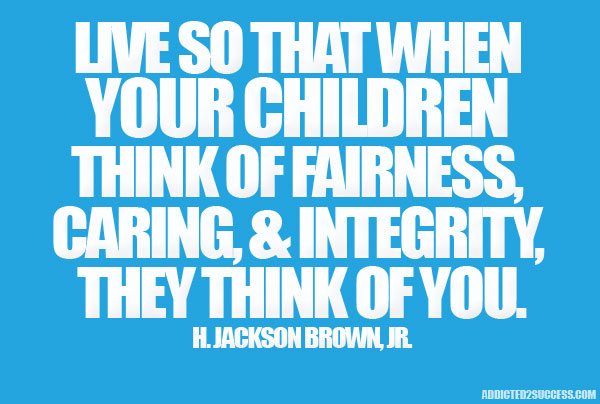Life
How & Why You Should Live A Life of Integrity
Have you ever stopped to assess how honest you are? Most people lie almost every single day, or at least omit the truth, and hide their real thoughts and feelings about what is happening. Why do people do this? Let’s explore that in an open and honest discussion, including what it’s like to live with integrity at all times… to be genuine and real.
Most people consider themselves to be “good”. After a career of working with dangerous and recidivist offenders, I have had some of the most dishonest and selfish people in New Zealand tell me time and time again that they see themselves as basically good people. And a huge majority of the non-criminal friends and associates I have had also indicate that they see themselves as people of integrity… “I only lie when I have too”.
So what is integrity? In my opinion this concept requires a best-effort attempt to at all times be transparent and honest. A person of integrity is, in my mind, someone who is the same person in all situations, from the boardroom meeting, to a funeral, to breakfast with their family. They do not hide their reactions or opinions, they do not manipulate others through deception, and they do not pretend.
Very few people I have met fit this strict criteria, because most people I know (including those I would put into the “good person” category) at least omit their view of the truth regularly. Think about yourself during a normal week; how many times do you:
- Tell someone you feel “fine” when really you feel otherwise?
- Smile and nod in agreement with something you do not agree with?
- Compliment someone to make them feel better, rather than because you feel a genuine impulsive desire to compliment them?
- Help someone out without asking for anything in return, but secretly make a mental note of the favour because they now “owe you one”?
- Allow someone to inconvenience you, frustrate you, or get in your way, just to avoid conflict?
Hey, we all do these things, so don’t beat yourself up! You may consider dishonesty to be limited to deliberately deceiving someone in a malicious way for your own benefit, when actually it goes far beyond that. You may find yourself being dishonest with the best of intentions. If you are like I was, you hide your feelings or tell lies for any of the following reasons:
- To keep a situation stable
- To avoid confrontation and conflict
- To prevent someone’s feelings from getting hurt
- To keep information confidential to ensure someone’s privacy
- To avoid hassle, including having to explain yourself or defend your actions
So what’s wrong with that? What’s wrong with being “nice”? I used to believe that there was nothing wrong with this, that in fact I was being a noble person with high social intuition and emotional quotient (EQ) by keeping the peace and facilitating a happy atmosphere. But then as time passed I realised that I was actually only creating short-term positive outcomes; that unbeknownst to me I was causing long-term negative consequences. By not honestly presenting my feelings about things each and every time I had the opportunity to, I had set some precedents that ended up with something negative I had to overcome later on.
Some of the negative consequences of telling “good” lies
Hiding your negative feelings in reaction to something someone does or says may seem like a legitimate strategy to keep the peace and avoid unnecessary conflict. However, what you are actually doing is condoning an idea or behaviour that you truly believe is negative, and therefore giving the person who is doing it unhelpful feedback. If, for example, a friend starts going on a racist rant and you don’t argue with him, just to avoid conflict, then you are giving him feedback that it is OK to be racist. You are setting him up to reinforce his own skewed views. Later on, he assaults someone for being a different race to him, all because no-one ever challenged his distorted views.
Helping out someone without asking for anything in return, yet secretly thinking that this person now owes you a favour, may feel like you are reducing their guilt in receiving your help. Think about it: you are actually increasing guilt! They now feel vaguely indebted to you or, more likely, they feel like they are imposing on you. If instead you tell them honestly that you will ask for their help for something in the future in return, not only will they feel totally guilt-free about the exchange, they will also get a better understanding of how valuable your time is. This way you don’t set a precedent of them under-valuing you and abusing your generosity.
Put yourself in the position of someone asking for help: doesn’t it feel better when you can offer them something back in return? Doesn’t something feel more valuable when it is not completely free?

Can you be honest in a safe way?
Yes, if you take the time to present your views and feelings appropriately. Obviously, if your boss says something you disagree with and you shout out “That’s ridiculous, don’t be such an idiot, I want you out of my life you moron!” then you put your job on the line. It’s all about how you present your feelings. There are many different ways to be honest, and being diplomatic and respectful can also have integrity. Showing respect for someone because of their position or relationship with you does not override honesty.
The only way to learn how to be genuinely honest in all situations is to practice it. You don’t have to dive straight into removing all dishonesty from your interactions this very instant. Once I realised I wanted to make this change, I started off gradually, with only observing my dishonesty at first. For a couple of weeks I didn’t try to be more honest, I just tried to catch myself out when I was lying or hiding my true feelings. I tried to analyse why I did it, and what the outcomes of doing so was.
Only after that did I start expressing my feelings more honestly, dishing them out over time in a controlled and experimental fashion. I would set mini-goals, like “today I will answer every question honestly”, or “in today’s team meeting I’m going to express that I think there could be a better way of doing x, y or z”.
So being honest is not about being brutally critical. If that’s how it comes out, then maybe you need to learn how to look for the positives in people rather than just the faults. One way of doing this is following the management practice of giving five positive feedback comments for every negative one. Don’t just express those negative feelings you hide, but also expand and increase your expression of positive ones to balance them out. There’s a lot of great things happening out there once you open your eyes by trying to find them.
One way of delivering feedback is to follow models of effective reflection. My favourite is the “BEID” model, which stands for:
Behaviour / Example / Impact / Do
Basically, to avoid personally attacking someone when you are trying to express a feeling, try following a template that clarifies what exactly you disagree with. If, for example, someone regularly makes you look bad in team meetings, you could pull them aside after one and express yourself using this model:
“I just wanted to give you some feedback on something you keep doing. I feel that you often undermine me in team meetings (behaviour), like today when you said that I didn’t get my report in on time (example). It makes me look bad in a situation where I’m not able to explain myself or the context (impact). What I would prefer is that you take me aside and discuss these with me before team meetings, so that we can look at alternatives to improve how I work (do)”.
This is much more effective than saying that he’s a jerk behind his back to your colleagues!
“The foundation stones for a balanced success are honesty, character, integrity, faith, love and loyalty.” – Zig Ziglar
Conclusion
There is a lot more required to the practical aspect of living a life of integrity, and it’s all about having control over how you express yourself. But it’s also about being honest with yourself first and foremost; admitting to yourself that not only can you be dishonest, you do it because you are afraid of the consequences of being honest.
I can tell you from personal experience that the transition to a life of integrity is nowhere near as hard as it seems to be. You’ll find people respect and trust you more, that they start seeking your feedback because of your integrity. One of the best things I noticed was that I felt much more comfortable and guilt-free in more situations, because I had nothing to hide. It made me feel like more of a real man.
I look forward to your honest feedback! Have a great week (and I genuinely mean that). Thanks for reading.
Life
Why Moving to a New City Can Change Your Mindset
Discover how moving to a new city boosts neuroplasticity, builds resilience, and reshapes your mindset

Relocation is always a challenge. Rebuilding and restarting your life requires you to step outside of your comfort zone. (more…)
Change Your Mindset
The Hidden Reason You Can’t Stay Consistent
If motivation keeps failing you, the real issue isn’t discipline. It’s the identity shaping your habits and long-term success.

Success often looks like a time-management problem. You buy a planner, set reminders, and hope that next week will be different. For a few days, it works. Then stress hits, motivation drops, and old patterns return. (more…)
Did You Know
How Skilled Migrants Are Building Successful Careers After Moving Countries
Behind every successful skilled migrant career is a mix of resilience, strategy, and navigating systems built for locals.

Moving to a new country for work is exciting, but it can also be unnerving. Skilled migrants leave behind familiar systems, networks, and support to pursue better job opportunities and a better future for their families. (more…)
-

 Business4 weeks ago
Business4 weeks agoHow Smart Brands Use Instagram Data to Outperform Competitors
-

 Business4 weeks ago
Business4 weeks agoThe Paradox of Modern Work: Can Tech Make Us More Human?
-

 Change Your Mindset3 weeks ago
Change Your Mindset3 weeks agoThe Hidden Reason You Can’t Stay Consistent
-

 Change Your Mindset3 weeks ago
Change Your Mindset3 weeks agoThe Real Psychology Behind Quitting Too Soon
-

 Entrepreneurs2 weeks ago
Entrepreneurs2 weeks agoThe Six Pillars That Ground Purpose-Driven Leadership (The Berenyi Life Blueprint)
-

 Business3 weeks ago
Business3 weeks agoDIY vs Delegate: The Real Reason You’re Burned Out
-

 Business3 weeks ago
Business3 weeks agoHow AI Agents Can Quietly Expose Your Business to Serious Risk
-

 Life3 weeks ago
Life3 weeks agoWhy Moving to a New City Can Change Your Mindset



























28 Comments